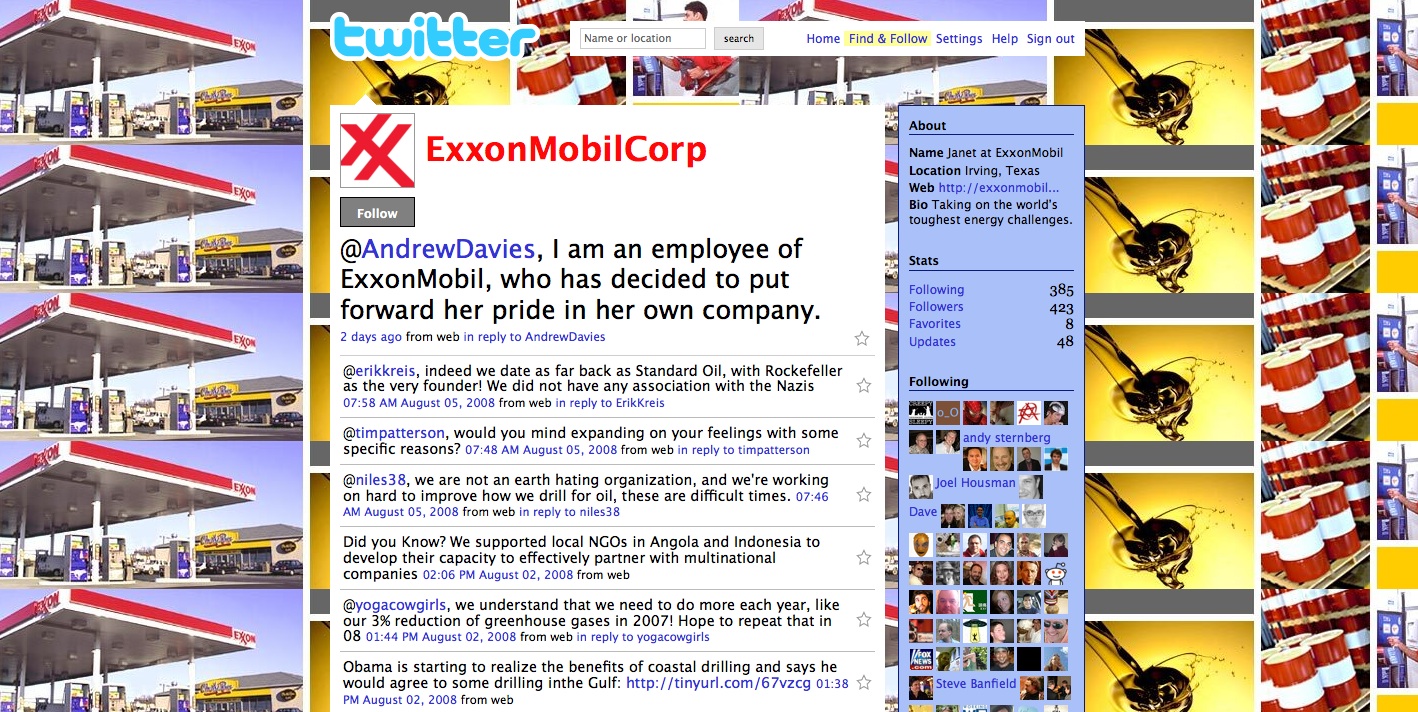Internet brand-jacking: What can be learned from Exxon Mobil?

Exxon Mobil got "brand-jacked."
About two weeks ago, someone named "Janet," believed to be a spokesperson for the oil company, started posting one-liner comments about the company on Twitter. There was no reason to doubt the legitimacy of the Twitter account. There are a lot of big-named companies (this site included) that are promoting themselves through Twitter blasts. And her posts were just what you might expect from a company spokesperson:
- we are not an earth hating organization, and we're working on hard to improve how we drill for oil, these are difficult times.
- we used revenues as reinvestment into R&D. In 2007 we invested $21bil in refining capacity to reduce the future cost of petroleum.
- Did You Know? ExxonMobil reduced its Greenhouse Gas Emissions by 5 million metric tons from 2006 to 2007!
- ExxonMobil's primary concern is to safely provide reliable and affordable supplies of energy to people around the world
Here's the thing: Exxon Mobil says it is not behind this marketing ploy, has no idea who Janet is and didn't even know about it until a newspaper reporter asked about it. Computerworld quotes the real Exxon Mobil spokesman, Alan Jeffers:
"She is not an authorized person to speak on behalf of the company," he said. "There are several inaccuracies [on Twitter]. We take great care in having authorized people speak on behalf of the company. We want to make sure anyone who is speaking for the company is doing so accurately."
And yet, Janet's account is still active, out there on the Internet for anyone to see.
Could it be that Exxon Mobil (or any company, for that matter) is OK with having its brand hijacked on the Internet if the hijacker says nice things? You can pretty much bet that the company's lawyers would have issued a take-down order against Twitter if Janet's posts had been spewing hate about high gas prices, Exxon Mobil's record-breaking profits and its image as the poster child of corporate greed. Even the unauthorized use of the company's logo on the Twitter page should have been enough to generate a letter from the lawyers.
Forrester Research senior analyst Jeremiah Owyang, who was also duped by Janet, originally congratulated Exxon Mobil on his blog for jumping into the world of micro-blogging. Later, as the story unraveled, he posted a second entry that, among other things, offers some advice to Janet:
Janet, I highly recommend that you do one of the following: 1) Turn over the Twitter ID keys to Exxon, 2) indicate that you’re not an official representative. I see that you’re attempting to preserve the brand, but you can be a brand advocate to Exxon without attempting to pretend to be an employee –in fact, you may be hurting the brand.
But more importantly, Owyang points out some valuable lessons that should be taken away from this Exxon/Twitter story:
Lack of identity confirmation continues to plague the web Identity is a serious issue on the web, we’ve no great way of confirming true profiles, therefore, going forward, before we can conclude a blog or twitter or Facebook account is official, we need to see trackbacks coming from the corporate site, or contact info and get confirmation.
Companies must monitor their brand Brands should be monitoring the discussion and instances of their keywords in social networks –failure to do so results in becoming case studies.
An opportunity for the real Exxon to step forward The power has shifted to those that participate, so while Janet may have achieved momentum by participating, further opportunity lies within Exxon when they’re ready to come forward.
The community (myself included) need to first validate identities This fourth one, I just added. It was too easy for someone to assume a brand’s identity and we all fell for it, myself obviously. We need to first determine if these are the real employees and validate. I’m exploring some ways to do this, we’ll revisit this topic soon.
Legal and Trademark issues complicate Update 12 hours later: It’s become clear that even more issues are bubbling up from comments, and the social media club dlist, which I’m part of. For example, in UK there are clear laws (not just guidelines) about being transparent about buzz marketing campaigns, and some are suggesting that Twitter be responsible for being a brand cop, while some say brands should be accountable. Some are suggesting that Janet become the “Scoble” of Exxon while Marshall Kirkpatrick says Exxon should walk completely away from Twitter.
This list is a good start - but are there other lessons to be learned here? Here's what I what add to the list: Companies need to come up with policies that address employee evangelism, especially in online forums such as social networking and social media sites. They should also consider the potential ramifications - from a reaction from Wall Street or Washington to a direct impact on the bottom line. The Securities and Exchange Commission recently voted unanimously to provide new guidance that allows public companies to use their Web sites and corporate blogs to meet Regulation FD’s public disclosure requirements.
I'll let the lawyers argue the point. But seeing how Twitter is, by definition, a blog and how Janet's page appeared to be managed by the company, could it be defined as a "corporate blog" under the SEC's standards?
What lessons would you add to this list?
